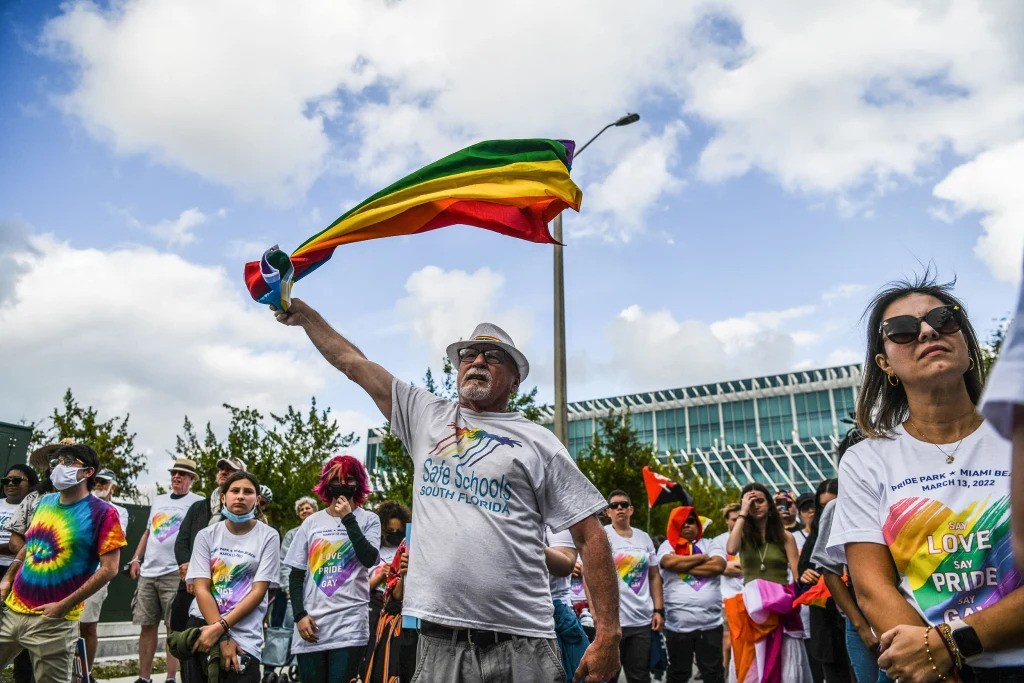News | February 15th, 2024
Florida’s Rainbow Connection
By: Cordell Jones | Staff Writer

Senate Bill 1120, introduced to the Florida Senate on January 24, 2024, attempts to ban the usage of flying pride flags at government properties, as it is seen as “representing a political ideology viewpoint.” This bill stands amongst the other countless bills created to strike down upon the freedoms of LGBTQ+ Floridians.
Within the past couple of years, the introduction of the controversial “Don’t Say Gay” bill and others has caused community members in the state to question if they are indeed protected under the governed law. Moreover, if the state was ever on the right side of history with LGBTQ+ rights.
One point of Florida’s history that can be brought into the conversation would be a 1964 state government report entitled “Homosexuality and Citizenship in Florida,” otherwise known as “The Purple Pamphlet.” The pamphlet contains recommendations on how to treat the LGBTQ+ community in the state, such as tracking them, firing teachers who are found to be a part of the community and filing specific actions as “homosexual offenses,” among other things.
According to Brian Fehler, author of a Medium article that discusses the pamphlet at length, citizens of Florida at the time never objected to the “intense homophobia” that was rampant throughout the report. This is not only a one-time event, as it has been an underlying stance people within the state have taken. History has continuously not been kind to Florida residents who reside within the community.
The history showed itself again in 1977 with the “Save Our Children” movement. This movement, started by singer Anita Bryant, was created to stop homosexual men from adopting children and painted the community under the same pedophiliac rhetoric that existed within more significant portions of the country. This movement then led to a future ban on gay adoptions, an act that also illustrates the legislative history of LGBTQ+ protections being infringed upon.
Trinity Talton, third-year broadcast journalism scholar, discusses how the bills and past history make LGBTQ+ citizens feel unsafe in the state.
“As a government body, it is their jobs to enforce and make laws that make citizens feel safe and protected within society. Especially, the recent bills that have been passed has interrupted the queer community’s connection with government and violates their safety,” Trinity said.
This history has repeated with the legislature created through Governor Ron Desantis’s tenure as state governor. In a 2021 interview with NPR’s Michel Martin, state representative Carlos Guillermo Smith talks about how there are steps forward and backward with legislative freedoms in the state. “So, there are steps forward, and now we’re seeing a backlash. Our governor just recently signed a bill banning trans students from playing in school sports. He vetoed critical funding for Pulse survivors,” he said.
In addition to the bills previously mentioned, bills like HB 999 that restrict DEI organizations from receiving state funding, HB 1421 that restrict gender-affirming care for trans citizens and HB 1223 revising policies on gender pronouns and sex, all of which help to add to issues plaguing Florida citizens and their protected rights.
Justin Matthews, recent FAMU graduate, shares how he thinks Florida can improve its connection to the LGBTQ+ community.
“Some ways that the state can improve the relationship with the LGBTQ+ community would be to stop making harmful legislation that removes already existing ways of life like people aren’t still currently in them,” he said.
Some are left without accessible healthcare, not to mention lacking government-funded places that would shelter or fight on behalf of the plight continued by the laws put in place. It not only creates an unsafe space to live in but also adds to the long history of Florida and the United States mishandling the equal rights of those that exist within the LGBTQ+ community.
Over time, one could hope that a connection can be made between those in and outside the community. However, time has continued to tell a different, bleaker story.





